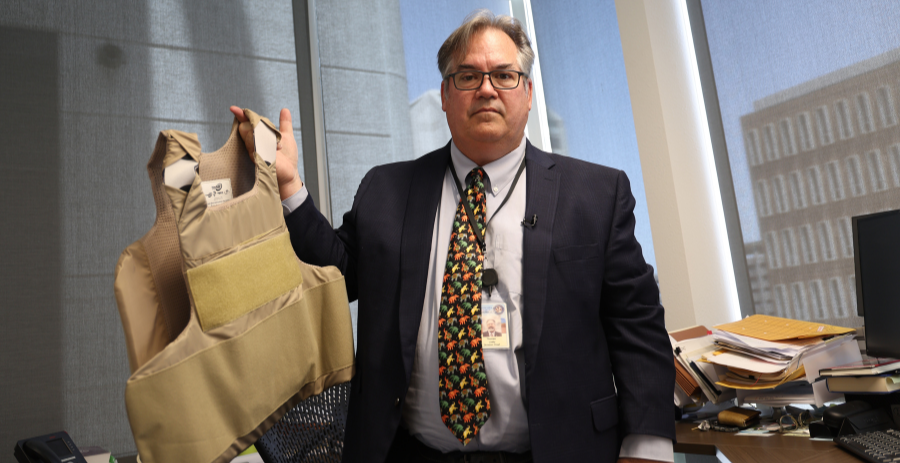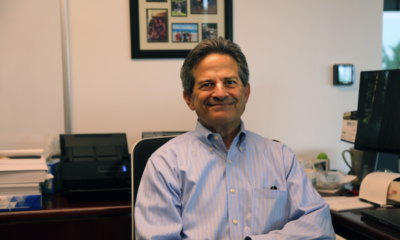2024 election
America’s Battle Against Election Intimidation: Ensuring Safety Comes First

Editor’s Note: This story contains graphic language from threatening voicemails and emails sent to election officials across the U.S.
ROCHESTER HILLS, Mich. – A week after the contentious 2020 presidential election, city clerk Tina Barton received a voicemail that would alter her life forever. Her week had been marked by relentless scrutiny and stress as her office managed an election rife with accusations of fraud, particularly in Michigan.
Upon retrieving the message, Barton heard a threatening voice declare, “We will f***ing take you out,” before spouting invective related to former President Donald Trump’s baseless claims about the election’s legitimacy. The caller’s words invoked shock and fear for both her and her family.
Frightened, Barton promptly filed a police report and took extensive security measures, increasing vigilance at her home and changing her routines. She installed outdoor cameras and floodlights, fearing potential threats from strangers fueled by misinformation. Barton has since transitioned from her electoral role to training other officials who might face similar dangers.
The aftermath of the 2020 election has fundamentally transformed the roles of election workers, who previously enjoyed a low-profile, often anonymous position. Now, they are subject to increasingly aggressive threats, fueled by misinformation and political strife.
In Georgia, one election administrator received a death threat with his likeness in crosshairs. Meanwhile, an official in Arizona celebrated Thanksgiving under guard due to similar risks. Social media, emails, and even in-person confrontations have all become avenues for these disturbing threats.
The situation has escalated with the rise of political figures, such as Kari Lake in Arizona, who have echoed Trump’s claims leading to further hostility against election officials. Of the 20 cases prosecuted by the U.S. Department of Justice’s Election Threats Task Force, more than a third involve Arizona officials.
A study from the Brennan Center for Justice in May indicated that 54% of election workers express safety concerns, with 34% knowing someone who left the job due to harassment. Those who remain fear for their safety yet feel compelled to serve in future elections.
To strengthen election security in the current cycle, several election offices are upgrading defenses. In Shasta County, California, towering security fences have been erected to deter threats. Meanwhile, in various regions, law enforcement is adopting heightened scrutiny of election safety, recognizing a newfound urgency.
Legislative measures are also in motion, with 60 bills introduced over the past two years aimed at protecting election workers against intimidation. Approximately half of those proposals have been ratified into law. However, some states, including Georgia and Texas, have introduced regulations limiting voting access under the pretext of safeguarding electoral integrity.
These conditions keep election administrators constantly adapting to a tumultuous political landscape. As Rosanne Rickabaugh, deputy director of elections in Ohio, aptly puts it, the state of democracy hangs in the balance.
Chris Harvey, who oversaw Georgia elections, never anticipated threats upon leaving law enforcement. Yet, a chilling email before a runoff in January 2021 warned him of impending danger, showcasing alarming vulnerabilities within the system.
Harvey has since focused on educating law enforcement about election laws to ensure preparedness against potential conflicts at polling stations. His initiative emphasizes the critical intersection between law enforcement and electoral processes.
In a bid to maintain order, local election officials and police have formed committees to enhance election security and facilitate joint training exercises. Barton now serves as vice chair of such a committee, sharing her experience to evoke necessary empathy and understanding among law enforcement training programs.
In Arizona, Sheriff Russ Skinner prioritizes election security by planning to station plainclothes officers at polling locations to safeguard both workers and voters. “We treat the election process as a major event,” Skinner asserts.
The threat landscape expanded after the 2020 elections, especially in states like Arizona during the 2022 gubernatorial race. Bill Gates, a Maricopa County Supervisor, witnessed this escalation firsthand, facing messages rife with threats and vitriol following the primaries.
Tom Liddy, who oversees civil duties in Maricopa County, received numerous alarming communications, prompting FBI intervention to protect him and his family. Threats often include personal details, heightening fears for physical safety.
The DOJ’s Election Threats Task Force has prosecuted nearly 20 individuals for similar threats, tracking the alarming trend stemming from mental health issues or an overwhelming influence of disinformation, particularly during the tumultuous periods marked by the pandemic.
Despite these prosecutions, many express concern that the government is not doing enough to protect election officials from harassment. Senator Jon Ossoff has called for thorough investigations into threats against election officials, pressing for better allocation of federal resources.
Some states are taking initiative, with Maine mandating de-escalation training for officials, while Michigan has made intimidating election staff a misdemeanor. Arizona has passed measures that protect the personal addresses of election workers, aiming to safeguard them from potential threats.
The challenges facing U.S. democracy are vast and complex, but decisive steps are being taken to restore safety and trust in the electoral process. Just weeks ago, Barton faced her tormentor in court, shedding light on over 1,300 days of trauma. Though the sentence served was short, the ramifications of threats against election officials remain a pressing concern affecting the heart of democratic governance.
In the battle for securing electoral integrity, states and communities continue to adapt, recognizing the vital role of election workers in safeguarding democracy.
News21 reporters contributed to this story as part of an examination into the state of American democracy.


















